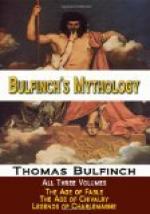The next day the Countess caused all her subjects to assemble, and showed them that her earldom was left defenceless, and that it could not be protected but with horse and arms, and military skill. “Therefore,” said she, “this is what I offer for your choice: either let one of you take me, or give your consent for me to take a husband from elsewhere, to defend my dominions.”
So they came to the determination that it was better that she should have permission to marry some one from elsewhere; and thereupon she sent for the bishops and archbishops, to celebrate her nuptials with Owain. And the men of the earldom did Owain homage.
And Owain defended the fountain with lance and sword. And this is the manner in which he defended it. Whensoever a knight came there, he overthrew him, and sold him for his full worth. And what he thus gained he divided among his barons and his knights, and no man in the whole world could be more beloved than he was by his subjects. And it was thus for the space of three years.
[Footnote: There exists an ancient poem, printed among those of Taliesin, called the “Elegy of Owain ap Urien,” and containing several very beautiful and spirited passages It commences
“The soul of Owain ap Urien,
May its Lord consider its exigencies’
Reged’s chief the green turf
covers.”
In the course of this Elegy the bard, alluding to the incessant warfare with which this chieftain harassed his Saxon foes, exclaims,
“Could England sleep with the light upon her eyes’”]
CHAPTER IV
The lady of the fountain (Continued)
GAWAIN’S ADVENTURE
It befell that, as Gawain went forth one day with King Arthur, he perceived him to be very sad and sorrowful. And Gawain was much grieved to see Arthur in his state, and he questioned him, saying, “O my lord, what has befallen thee?” “In sooth, Gawain,” said Arthur, “I am grieved concerning Owain, whom I have lost these three years; and I shall certainly die if the fourth year pass without my seeing him. Now I am sure that it is through the tale which Kynon, the son of Clydno, related, that I have lost Owain.” “There is no need for thee,” said Gawain, “to summon to arms thy whole dominions on this account, for thou thyself, and the men of thy household, will be able to avenge Owain if he be slain or to set him free if he be in prison; and, if alive, to bring him back with thee.” And it was settled according to what Gawain had said.




